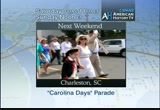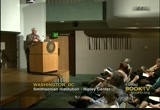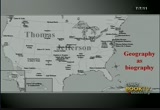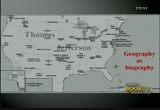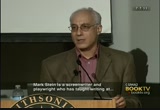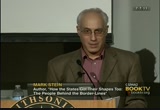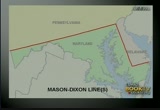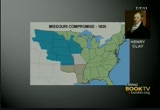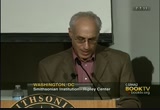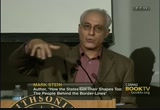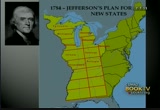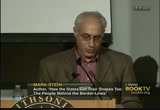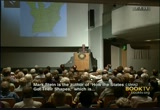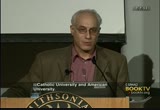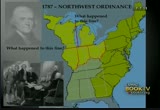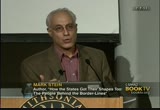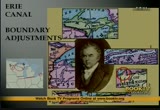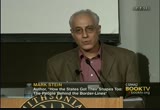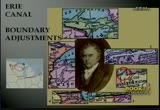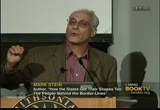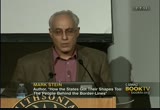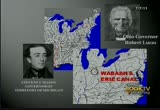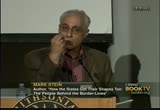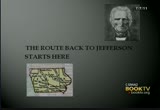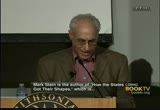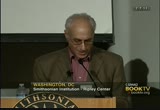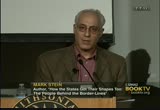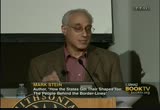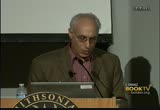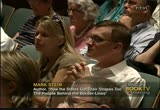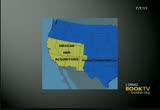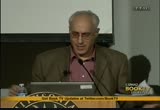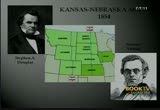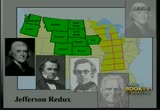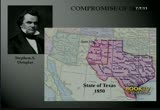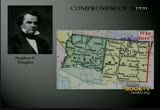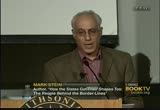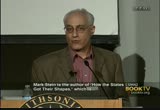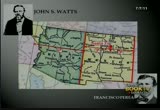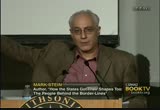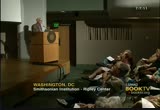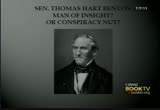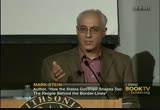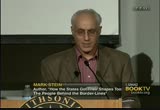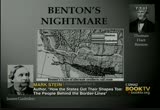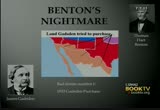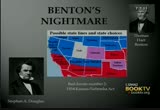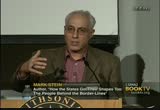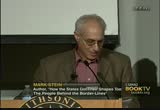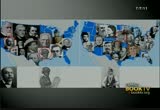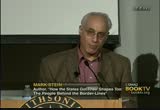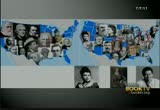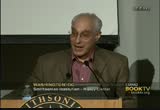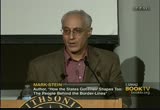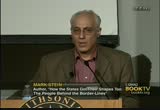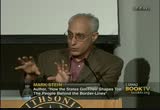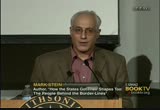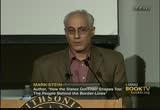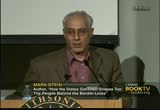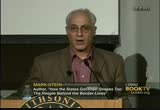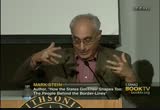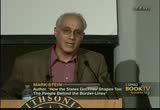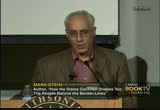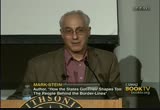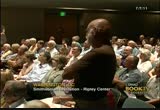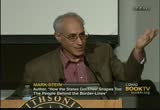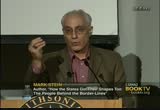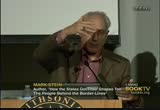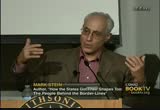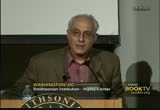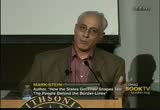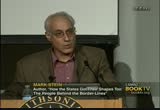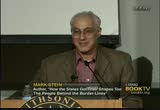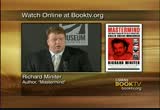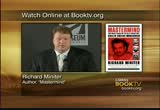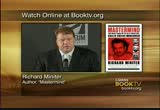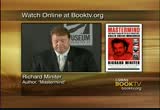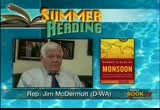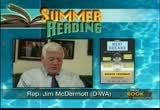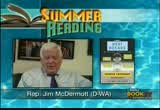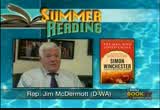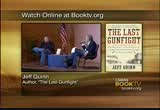tv Book TV CSPAN July 23, 2011 6:45pm-8:15pm EDT
6:45 pm
next, mark stein examines the many people who shape state boundaries. the author's profile from brigham young's influence in utah and jeremiah dickson and charles mason. the british surveyors noted for their lines that separated maryland and delaware. it is about an hour. [applause] >> thank you. when i wrote "how the states got their shapes too," i was dealing with -- and in doing that i
6:46 pm
encountered stories of people who were involved with the book was unable to contain those stories and so, this book is a collection of the people who i countered that i subsequently looked into that created the lines. both books are really seeking to answer one question. which is how did we get from this to this? and, in the second book, some of the chapters deal with people not with these particular lines but who tried to put more of these lines on the map but failed or people who have tried and in some cases are currently trying to change some of those lines.
6:47 pm
if you walk out of hand out it should look very much like this. these are the names of the people that i looked into. a number of them i will be talking about tonight but i wanted you all to have a copy so later when we do questions it can maybe help formulate questions or help others follow what you are talking about. what intrigued me about all of these people though was that none of them and in fact as far as i know no person ever said when they were a kid, when i grow up i want to establish a state line. [laughter] what i found was that all of these people had a quest. their own personal quest that somehow ended up impacting on where a line is today. if you look at these names or the names in their hand out you will see that some of them are famous and some of them are not famous, and some of them you have heard of but you don't really know why, nor did i.
6:48 pm
i don't know if i will be able to make this point. daniel webster at the top of main, what did he ever really do? most of us don't know. i didn't before i started. stephen douglas who is in the middle of this map a number of times, debated abraham lincoln. what else? some of them are people that we have heard of but i discovered that what i have heard wasn't quite the whole story. in some cases it was simply wrong. if you look to rhode island you will see roger williams. i was taught in school that roger williams founded rhode island to established religious tolerance. true enough. what i didn't know was that he did it for religious reasons. he wasn't kicked out of the massachusetts bay colony because he was some loosey-goosey liberal guy but rather because he was too puritan for the puritans. [laughter] i will give you a quick example. there were other incidents in
6:49 pm
massachusetts but the colonial charter that created the colony he ganz with the words charles i the grace of god and roger williams said, how do we know he has the grace of god? we don't know who does and who does not have the grace of god and therefore do we really have the right to take this land from these natives? and his fellow puritan said roger, roger, he would be quiet and eventually things like that got him kicked out. another name that is very misunderstood and i want to take a few moments to talk about it because it is a springboard to the larger issue i want to kind of follow following the discussion tonight, is mason and dickson, the famous line that they have contributed to the map, then mason and dickson line
6:50 pm
widely believed as the separation of the free states from the slave states. absolutely incorrect. that that is the mason dickson line. it is not a line. it is three lines. it was created or surveyed by mason and dickson to as best they could medicaid complex in the colonial documents that created pennsylvania, maryland and delaware. now, they don't quite know but it could infect the that the phrase dixie calms from the name jeremiah dixon. but jeremiah dixon was not a southerner. jeremiah dixon wasn't even an american. charles mason and jeremiah dixon were two very eminent redish scientists and to get mason and dixon to come over here to become surveyors of this line was the equivalent of getting most are too play at the prom.
6:51 pm
they came here in 1763 before the revolution. in 1763, there was no prohibition of slavery in any of the colonies and in fact slavery existed in most if not all of the colonies. so, the question becomes, where did we get this phrase mason-dixon line as referring to the free states and the slave states? the answer is with the louisiana purchase in 1803. president jefferson made this purchase and very soon a question arose, what about slavery and this new region? it wasn't until 1820 that got resolved in what is called the missouri compromise. this compromise was authored by henry clay and it established a line. the key word there is line. the missouri compromise is is the line at 36 degrees, 30 minutes. it was an extension give or take
6:52 pm
given some poor surveying of the boundary from below virginia, below kentucky and it said that no new state or territory north of 36 degrees 30 minutes can have slavery with the exception of missouri, that being the compromise. after that was established, four years later, and this is their earliest i could find it. it may have already been in the news before that. i found their preference by john randolph, congressman from virginia, which is the earliest reference i could find to the mason-dixon line as a line dividing three states from slave states. randolph said on the floor of the congress, we who belong to that unfortunate portion of this confederacy which is south of the of the mason and dixon line and east of the allegheny mountains has to make up our minds to paris or we have must resort to the measures which we first opposed to british
6:53 pm
aggression and usurpation. so it is sort of interesting that as early as 1824 and in fact earlier, already out in the open was with the idea of southern independence from the union later come to be called secession. so it was at that point that we started seeing the shorthand with the mason-dixon line. but if you look closely at the map you will notice that parts of slaveholding areas east of the allegheny is our north of the mason-dixon line and delaware goes a little above the mason-dixon line. what is now west virginia. at the time it was still virginia, has a whole panhandle pan handle panhandle sticking up between it and ohio north of the line and you may be able to see that new hampshire, have kind of a checkerboard color. new hampshire did not officially abolish slavery until the civil war so it is really a shorthand to our language. but i wanted to talk about it because slavery is one of the
6:54 pm
two underlying elements that i want to follow a bit tonight. for the people that because of slavery established a great deal of the lines along the american map and also to talk about another underlying elements that came to be entwined with slavery, and that is the vision of this man, thomas jefferson. in 1784, congress assigns thomas jefferson to the task of coming up with a way to create new states. it is not in the constitution, so we needed some kind of method for doing so. this was the proposal for the states that jefferson handed in. probably the first thing to strike you is, well that ain't what we got. nor did we keep most of those names although two of them have kind of survived, mischa gain you and illinois a.
6:55 pm
but, jefferson, what is intriguing to me is that jefferson had a quest as well and when he issued this report and made this suggestion, he made a statement that you may not quite follow everything is suggested here and i will get into that right after. you will hear the request. you will recognize the quest of thomas jefferson. with respect to new states, with the question to stand simply in this form, how may the altar montagne territory, that means the territory west of the allegheny mountains, be disposed of so as to produce the greatest and most immediate benefit to the inhabitants of the maritime states. those are the darker green states along the east. the plan would be laying it off into two or more states only. it requires us to put the question and it's just form. how may the territory are beginning to be disposed of so
6:56 pm
as to produce the greatest degree of happiness to its inhabitants? there is that quest. jefferson had two things in mind here with happiness. one was much smaller states than then we ended up with. he believed that if a state was too big, it would end up containing people from too many, too diverse groups and would eventually crumble. he knew of what he was speaking because his state, virginia, at that point in time, included what is now virginia, kentucky and west virginia. and it was not a happy state and in infected later broke up. kentucky was seated right around this time. west virginia not until the civil war. but the other thing jefferson was talking about was who controls the senate. all these maritime states he talked about, the darker green
6:57 pm
states on a map, have rivers and water wise that flow to the atlantic. west of the appalachian, the waterways flow directly into the gulf and they find their way ultimately to the mississippi river. at that point in time the mississippi river was controlled by spain. and now what is tennessee, they proclaim themselves a state without congress approval called franklin and they talked about proclaiming themselves the republic called franklin and opening negotiations with spain for navigation along the mississippi river. so congress had to get its act in gear pronto, and they also wanted to, to, the issue would be in terms of spain and things like that, who would control the river? the biggest provision -- i guess the first question i want to point out is when the congress began to tinker with the founding fathers vision? we hear a lot today about
6:58 pm
tinkering of the founding fathers vision. it began in 18 days after jefferson handed in his report. they started to tinker with it, but the biggest change came three years later when congress passed the northwest ordinance. that divided the area in light green, which is called the northwest territory. in his period of time they also started creating and laying out what became the future boundaries for kentucky, tennessee, alabama and mississippi. as you can see, they didn't follow jeffersons mission at all and as you can see, some of these lines are in fact the lines that exist in the states today for illinois, indiana and ohio. but you can also see who controls the senate. because if you add up those states that we have in this region today, they do not equal the number of states in the maritime site. this was probably the biggest
6:59 pm
gerrymandering in the history of the united states. now two of these lines are not lines that we have today and so, the next question is, what happened to that horizontal line into that vertical line through lake michigan? this man happened. jeffrey holly accepted more state lines than any other person with the exception of stephen a. douglas, but jesse halloway did it from jail. jesse holley was a flower merchant in western new york. he would transport the flower to the east. the company that controlled the navigation on the mohawk had promised the merchants moving into western new york that they would improve the navigation. but, they didn't and jesse holley and probably others went bankrupt. when you go bankrupt in those
7:00 pm
years, you go to debtors prison. while he was in debtors prison, he wrote a series of lengthy articles that he published in the newspapers using the pseudonym because debtors prison wasn't really good for the resume, in which he described an idea that he had. that idea was the erie canal. jesse holley was not the first person to imagine such a canal, and by the way up there in-box number one -- what did i do? there we go. that is the erie canal. it begins in buffalo at the eastern end of lake erie and it crosses through western new york to albany where it meets the hudson river and then it goes down to the port at new york. ..
7:01 pm
7:02 pm
end of pennsylvania. that is a port on lake erie. just below box three you will see the red line is the line from the ordinance of 1787 that congress had established, but then with the erie canal congress moved the northern border of indiana number 10 miles to give it a part of geary. he will also see ohio moved but it isn't st. 10 miles wide and they moved north 10 miles, the answer is congress didn't move it. ohio did. we will come back to that in a moment. they're five and six on the map over in that box to the left, thus wisconsin. there were two changes made to the territory of wisconsin deutsch to the erie canal. one was the western boundary
7:03 pm
number five was taken away from the future state of wisconsin and given to the future state the would be created to the west, which is minnesota, and that provide of minnesota with a port at duluth and then the number six seed shows the upper peninsula which extends off of wisconsin. the was removed from wisconsin and given to michigan because of that line down there between ohio and michigan. when ohio wrote its constitution for statehood in i believe 1803, they suspected that this line east from the bottom of lake michigan and the ordinance of 1787 -- keep in mind because it is on paper doesn't mean people know where it really is that the suspected that it would cut off the western river in ohio from its port or where it empties into lake erie at toledo so they
7:04 pm
describe the northern border a little differently. they describe it as going from the northern end of the top of toledo to the bottom of the point of lake michigan stopping when it reaches the indianan boundary. that is why ohio has a slightly angled line. congress didn't have -- be recognized ohio made a little shift. they didn't see it as that big a deal until the 1830's when this man began to leave to became the governor of michigan. stevens mason was 19-years-old when president jackson appointed him to be the secretary of the territory of michigan and in effect that made him the governor because the governor at that point had basically gone fishing. the people in michigan were outraged, and they sent letters to the president saying please, get rid of this cade and give us
7:05 pm
a man as the governor. so, mason had a class, and it was to show he was a man and he had this moxie to lead the state. when he became first in effect governor and the territorial governor, we are now talking the early 1830's there were a lot more in the callis because of the erie canal, and one in particular connected to the river where that circle is on the map to the maumee river. what that did is create a waterway through the entire year hinterland of the united states. i will start at the bottom, and this is now looking at this map. if you start in new orleans and go up mississippi to the ohio river to the river through the
7:06 pm
erie canal into lake erie to the erie canal to the hudson to the ocean that is an incredible highland, and the hub is toledo. so steven mason was the first governor in the territory of michigan to challenge that adjustment that ohio made, and the governor of ohio, robert flucas, said we are a state, you are a territory, you cannot alter a state line without our consent. i'm abbreviating things enormously. maysan in effect said and whose army is going to stop us? and he called the territory militia which my army is going to stop yours and he called up ohio's militia and we had the to face-to-face on what is known as the toledo war, which almost
7:07 pm
sparked the full scale combat but didn't because congress quickly intervened and said to michigan how about this? we will give you this peninsula coming off -- wisconsin. hardly anyone even living there. >> how about you let ohio have its way and to simplify michigan finally said okay we will take the deal. robert lucas went on to become the territorial governor of iowa, and it was in that capacity that we begin to return to quite a route yet to thomas jefferson. lucas, too, had a quest. he was quite a character. i would like to take a moment to read you three excerpt from the times of robert lucas. the first is from the cleveland
7:08 pm
harold in 1838 so the point of 1838 is this after he has won this dispute with fresh again and had been appointed, just been appointed to become the territorial of honor of ohio. governor locuses one of the most deserving men in the party and we approve a good governor of their territory of iowa. he is an old-fashioned, honest and intelligent western pioneer. the second is a letter that lucas wrote many years earlier during the war 1812 when he was a young officer and he wrote a letter to a fellow officer. what's important to keep in mind is the words you are hearing. he put in writing. he wrote never was there a more patriotic army that had a completely in their power to accomplish every object of their desire than the present, and it must now be set in disgrace for want of a general lack their
7:09 pm
hands. neither was there either men of talent as there are so shamefully yep opposed by imbecile commanders. first of all, the grammar isn't perfect because this man was suffocated by a smart. secondly, you put that in writing? you could get in a lot of trouble. but this was a man as we saw with michigan and ohio, and as we see here back in the war of 1812, a pioneer, which is to say he would go and get what he wanted. example number three of this is from an all - paper of 1832 and the plan of 1832 this is before the conflict with michigan altogether. when the colonel of the regimen and something younger than he is now, he seduced a young lady who sued him for breach of marriage contract and got a judgment against him. and when he had put all his
7:10 pm
property out his hands and nothing could be got, he was put in jail and then issued his orders for his regiment to come and rescue him from the custody of the law. [laughter] they didn't come and rescue from the custody of the law and he made good on his debt, but this is one prohibit guy but by the time he can that guy, the governor of ohio and now the territorial governor of iowa she had all that in him that he had learned to do it within the ground rules. when he became the governor of iowa, ironically he encountered an identical boundary conflict that he had had an ohio. this was between the boundary of
7:11 pm
the southern borders ytoy and of the northern borders missouri. the only difference is that he was now at the territorial governors opposing the governor of the state a and opposing the way the boundary had been surveyed compared to the way that it had been, might have been stipulated. i want to go into the details of that. the point is that lucas one. this is where steven mason did not. he played his part differently and was much more patient and ultimately i yellow when that conflict. lucas also wanted a different northern border for iowa. these lines actually make sense in a way. they follow the mississippi river to the minnesota river. then there's a straight line of the northwest that takes it refers to this where river and follows the sue river to the missouri river. it's not a logical.
7:12 pm
in fact in its day it made sense in comparison to other states in the northwest territories if that were iowa it would look of a different. but when i know what came up for statehood with that proposed border, samuel, a congressman from ohio, opposed it. and what is important about it is that in opposing it, they reminded congress about the jefferson's original vision of 74 and how congress in 1787 st from that division. it then went on to say this. what has been the effect of this change? of the fertile region between the ohio, the leaks and the mississippi, and that's those five states, ohio, indiana, illinois, wisconsin and michigan has been reduced from 12 to 14 states to fight that the most. it can never have but ten votes
7:13 pm
in the senate. as an equitable compensation to the western country for this flagrant justice, on a would make a series of small states on the opposite bank of the mississippi river. vinton then proposed a straight line border for the northern border of iowa. iowa had a nonvoting delegate across this who opposed this straight line. what's interesting for me is he said that flying is just an arbitrary line. and the question that i wanted to deal with now is was it an arbitrary line? and the answer to that begins with this man, stephen douglas. douglas was addressed before more lines than any other person on the map. he's one of those people that now we've heard of him he debated lincoln, right? he did. he also beat lincoln that was in the 1858 senate race and douglas
7:14 pm
won that election. douglas also had a quest. to become the president of the united states. and he tried to do that by preventing this nation from the fighting over slavery. so the issue of slavery and the vision of thomas jefferson begins to become intertwined and it starts here. the united states won the mexican war in 1848 and in doing so, the treaty that ended the war, the united states acquired this land in yellow. and very quickly the question came up as it did with the louisiana purchase what about slavery? because southerners could see probably you can, too the missouri compromise line wasn't going to work anymore. it wasn't going to maintain parity between the free states and the slave states.
7:15 pm
many of the state lines douglas affected dealt with that compromise line and it dealt with in this bill to act of 1854 which douglas route. in the snap, the red line is the missouri compromise line. but the main thing about the nebraska act is that it said we are not going to use a long and any more. we are no longer going to regulate where slavery can be or not be? from here on out the states and territories will decide for themselves whether or not to have slavery. it's a concept of popular sovereignty. it was extremely controversial. there was a huge dustup. when they finally voted and enacted, not many people noticed during the dustup douglas had made a change in his proposal. initially he proposed the southern border of kansas at 36 degrees and 30 minutes.
7:16 pm
it made sense. it made it adjacent to texas which entered the union in 1845. it followed along the line of misery but then he entered an amendment and raised the boundary by one-half of 1 degree. that left a gap. that gap is now the panhandle. why did he do it? and by the way, what does all that have to do with of the northern border of iowa? this. by creating this new baseline 37 degrees, whether intentionally or not i can't tell you because stephen douglas never spoke directly to what his intentions were. but what evolves over the upcoming years were a tier of prairie states with exactly 3 degrees of height. kansas, nebraska, north dakota and south dakota to read to the west using the same baseline
7:17 pm
mountainous states left good for agriculture with 4 degrees of tight. colorado, wyoming and montana. and if you look at iowa, it has almost exactly 3 degrees of height. more to the point what we see is jefferson's vision of states being created from a mathematical prototype has finally emerged on the map. in fact congress also started frequently making the states with 7 degrees of wit. north dakota, south dakota, wyoming, colorado, washington and oregon all have 7 degrees, washington and oregon give or take because of the coast. others close to 7 degrees. so we have this prototype of jefferson that has reemerged. so we go from jefferson to robert lucas to samuel to
7:18 pm
stephen douglas and jefferson returns. well, here he is again. when you leave here today, you will know why stephen douglas was famous before he debated a one-term congressman who lost the election and later ran for president. the other piece of legislation that dealt with slavery that douglas was a great participant in was the compromise of 1850. that was a package of five bills and he was involved in two of them in particular, but the one i want to talk about is the bill that involved texas. texas when it entered the union it had been a republic. was much larger than the texas we have today. it continued for further north and all the way to my wyoming tapering as it went. it relinquished all of its land north of 36 degrees, 30 minutes because the missouri compromise was still in effect and they had
7:19 pm
slavery in texas and wanted to keep it so they let the united states have that land but it still included all the land east which is today the eastern half of mexico you see here. it also still included a whole lot of debt that it had incurred in its years as a republic so in 1850 this texas bill pete texas enough money so it could get out of debt and then in return brought this land that is to be part of mexico. in those two lines that defined the land we got from texas were established by stephen douglas. now it's no trick to understand that horizontal line at the bottom of the purchase that leaves out an important pass in the mountains in the state of texas, but this horizontal line, why did he put this line where it is? this 103 degrees west longitude.
7:20 pm
the answer to that surfaced in 1961 when the new mexico territory was decided in order to create the arizona territory. the delegate from the new mexico territory was a man named john mccullough's, and it was through him that this line dividing the territory to create arizona was proposed. a congressman from new york william wheeler questioned this line and said the only reason you put this line here is it continues from the line separating colorado and utah, so you get this nifty little for corner thing going on. walz disagreed with that and the first thing he pointed out is that it created almost exactly equal territory out of mexico
7:21 pm
and arizona. but he also spoke to the issue of race. that is where it gets interesting for me. let me explain to this is the bottom. he came from one of the old and wealthy families, mexican families and what had been the mexican province. approaching the war francisco wind up and down the rio grande valley which is virtually where all of the hispanic population was centered, urging them to remain loyal to the union. when the civil war broke out in fact, arizona did become a state, but it became a confederate state, and it didn't divide itself along this vertical line eight divided along the horizontal line. the southern half was arizona, the northern half was the
7:22 pm
mexico. the union sent troops to reclaim the land from confederate troops in texas who were defending it and there were several battles all of which were won by the union troops and so this area was reclaimed by the union. among those troops was francisco something else about this hispanic population along the rio grande is that they were many of them darker skinned. so this is what john watts, when we come back to the congress of 1861 also spoke to in terms of this horizontal -- this vertical boundary that he proposed. i find his words fascinating. there are many men in the territory of the mexico who, by living constantly in the open air and exposed to the rays of the burning sun have become bronze and complexion. whatever may be their color, the
7:23 pm
treaty stipulation's between the united states and of the republic of mexico have invested them with all of the privileges and immunities of american citizens. the first duty, which the government owes to its people is to give both military and civil protection. in this case, the government is under a double obligation. mexico was compelled to relinquish the right to a portion of her territory and the right to protect a portion of her people by the 10,000 pleasant memories and hopes and vv endeared by 10,000 painful for birding's for the future. but painful for earnings for the future? they can be described as what was a five letter word, a very dirty word on both hispanic population among the rio grande. i will just spell it, t-e-x-a-s.
7:24 pm
[laughter] people would come into mexico to the province and the one, two or three was an independent republic that became a state in the union and now they were beginning to migrate into this area at arizona and the hispanic population was nervous for their culture and their future. if you look at the geometry of this line that john botts proposed, it puts the rio grande as best as possible in the center of the mexican territory. and the largest population centers and today and it's a tree degrees from arizona creating a state or future state 6 degrees wide and at the same time arizona roughly 6 degrees wide in the amount of area that would entail. for this geometry to work you had to have a line at 1 degrees west longitude and that he
7:25 pm
proposed. it's the most brilliantly located line on the map. now douglas' efforts were very controversial particularly in kansas and nebraska act and the scrapping of government regulation of slavery. in the run-up to the civil war about both efforts of northerners and efforts by some owners tom brinton of missouri, senator bentsen was the great uncle thomas benton the great painter. but senator hart painted a very different picture, and he fought stephen douglas kansas nebraska act was part of a conspiracy of. i want to read to you what he said before the senate when they were debating the act.
7:26 pm
i must now work for the real object of a particular purpose which it was manufactured and the grand movement of which it is the base. jacinta and we will talk about in a moment it must be the time of this bill not to be conceived about the time of this bill 50 million for as much mexican territory on the southern borders would make five or six states, secondly, the mission of the ambassador to madrid, $250 million for cuba. we will talk about cuba in a minute. this nebraska bill is only an entering wedge to the future enterprises, the same manufacturer for a particular purpose, a steppingstone for a grant movement which is to develop itself in this country of ours.
7:27 pm
so what the senator was saying is that he sought a nightmare in the offing nina was based upon three bad dreams. bad dream number one was the purchase. james gadsden also had a quest. he was a southerner, and i would say this particular request in his adult life was to preserve the culture and lifestyle of his country as he saw which is euphemistic he wants to preserve slavery. as a young man he was an officer of the military and he repeatedly tried to negotiate himself with people like john c. calhoun and he may not have been the brightest bold in the chandelier but he didn't pick up on him and i went into it at least this dhaka this moment the mission to mexico got fouled up
7:28 pm
because of the things he did. to go to mexico to buy land for a railroad to go through to create the transcontinental railroad that would parallel to trash transcontinental railroad being planned for the middle of the country. about the big business and its involvement in the government and of the government bailing it out or the amount of money to big business has in the campaigns. this point in his life james gadson was a railroad president and 1853 the taxpayers in this country spent millions of dollars to acquire land so the railroads could build a railroad they could draw great profits from. but that wasn't his nightmare. the nightmare is the fact we didn't meet that land to create a seven continental railroad, transcontinental railroad. the white line that you see is
7:29 pm
the intention of the senate could be built without making this purchase and in the san francisco which is the great port. this when he was talking about ended at san diego which was just at that point in time a military base that went to the land where there was no commerce, no agriculture, no future for agriculture. why were they making a purchase way down there? they would suspect there's a hidden agenda and was fed by the fact that gadsden tried to purchase that land in orange and wasn't $50 million. he is authorized to spend up to $65 million. mexico didn't want to sell any land to the united states, but they were broke from the mexican war with the united states comes a santa ana was able to persuade his people to sell just enough
7:30 pm
land to raise just enough money so they could arm themselves and defend themselves against the people they were selling the land. but they wanted a great deal more. that was bad dream number two on the kansas and nebraska act. by letting people decide for themselves he viewed as did most of which is to become a slave state and the press would be free state. after a great deal of violence and bloodshed the actually became a free state but hit in a way of knowing that and 1854 california had been admitted to the union has a single great big state didn't have slavery but the debate to be coming to states and there was a movement afoot to divide california into two states and as james gadsden.
7:31 pm
the mexican territory had not yet been decided. but there was in the wind the idea that it may decide horizontally and i will mention this moment back during the civil war that effort was made. so that benton had the fear that there was a whole thing going on in the west regarding slave states and free states. this is the nightmare number three. the emission of the ambassador trying to buy it from spain which turned out didn't work out. but there was a movement, a secret plan widely discussed in the newspapers to raise a private army and invade cuba and rita inslee of the cubans who were colored either black or mixed and then to offer cuba to the united states. now, this wasn't plan, this was
7:32 pm
being organized by the governor of mississippi. what you see if there are news clippings before the effort was launched. the one of the top says the general contemplated the dissented on cuba and on the bottom right it says the cuba movement further preparations i think for the invasion of cuba and was widely discussed in the papers but delicate because officially the government didn't know about it or they should have to stop it. right before white men who launched his invasion, franklin pierce told him it was a no go. don't do it because the kansas nebraska act had just been passed and such an uproar he feared the at the uproar in the invasion in cuba would bring.
7:33 pm
so taken together, a bad dream number one, two and three created this nightmare for benton. that there could be a build of slave states that was large enough to defend itself and to sustain itself as an independent nation. so in fact, he wasn't crazy for having those years. countless people contributed to the state boundaries and aside from the white man i've been talking about i want to mention there were people from all walks of life. there were native americans such as the chief who sought to create a native american state called sequoia which would have occupied what is now the eastern
7:34 pm
side of oklahoma. there was sequoia involved in the negotiations that established the boundary between what is today oklahoma and arkansas ironically of the border. the chief standing bear impact on what is the northern border of nebraska. there were african americans. this is edward who sought to make oklahoma and african majority state. benjamin along with andrew surveyed the boundary line for the district of columbia in 1791. that is quite the gig for a black man. he was a fascinating figure and even today eleanor holmes norton seeks to create voting rights
7:35 pm
bill would alter the boundaries by creating a federal enclave. i would suppose would be called the state of new columbia. i would mention francisco, this is jose who was the leading voice for puerto rico becoming a state. they didn't follow his advice, but they did elect him the governor right after, so they had a good deal of admiration. and there were some women. the women were hard to get information on because they were not given a seat to the table, so i think the the great deal more impact and influence and i know of at least, but among them their efforts failed on behalf of the hawaiian nation that change the boundaries of the united states this is clearly in the nichols was involved in the
7:36 pm
contention that the creation of kansas, and once again, eleanor holmes norton. to me all of these people in their quest create a bureau of an ongoing progression of americans, and why the did with the did and where they did it turns the mural when you step away from it into a portrait. we are today. and that's what this book of mine is all about. thank you very much. [applause] >> [inaudible] [laughter]
7:37 pm
>> for evin alan they say even allen as vermont, the green mountain boys came into existence because at the time there was no vermont and if they believe the land of what is today vermont is part of new hampshire but the king of england gave it in 1763i believe to new york. well, by that time and hampshire have already sold land in what is today vermont and dated in new hampshire. and new york started selling in some cases the same land dating it in new york. some of that land was owned by evin allen and his brothers among others in new hampshire and the form of a vigilante group, truly a vigilante group called the green mountain police that went after these new
7:38 pm
yorkers are writing and the new hampshire land. ethan allen never built or never made furniture. but he earned a good deal of it. and he was a tough character when the revolution broke out he was also a smart character and thought i think i complete my cards differently with the green mountain boys and those are the green mountain boys we learned about in high school history. so there is the connection with the hampshire. yes, ma'am? >> it to the trinkle indian territory was used when ethnically cleansed the indians from the southeastern states they were shipped out to the reservations in oklahoma. approaching the
7:39 pm
turn-of-the-century the groundwork for this was leader earlier it became a state, and doing that meant congress had to change the way the land was titled in that territory it was held by tribes, and the act i believe and not 1900 to 1999 gave citizenship to indians and those tribes in return for the tribes redistributing the land so that is titled by individual indians which they've been able to be sold and broken up sort of a complicated thing. what's fascinating to me most about oklahoma's statehood because the lines were in place from the surrounding states there were three movements taking place virtually simultaneously. the first was this attempt by the native american tribes to create their own state to join
7:40 pm
together and they had a convention to do this and at the same time they were doing that the trouble and is the eastern end is when and when they were urging through advertisement to the birchers african-americans to migrate to the open land in western oklahoma so they could become an african-american majority stake to use of the persecution mainly in the south and the or roosevelt, the president, told both sides either one of these is going to happen. i'm going to veto it. , and then there was a fair to convention which was basically included native americans and whites but blacks were not welcome and in the constitution white supremacy and to do that
7:41 pm
they had to find a white person and they did it in a way that indians or white people but other delegates said roosevelt, teddy roosevelt is never going to sign a law with the constitution. so they backed away from that and simply core yet of oklahoma and the first act as the oklahoma legislature was to segregate the cars of oklahoma. >> you discuss your relationship with thomas benton and john fremont in california and also may be brigham young in utah and the mormons? >> ho i think it was his son-in-law, fremont, so benton was a backer of fremont was a general in the united states army and the mexican war ended a loose cannon and he probably
7:42 pm
wouldn't in history books at all because there were efforts to court martial him. i don't precede him deutsch in this book they don't affect the boundary. you asked about someone else? >> brigham young. >> brigham young was a mormon leader. he led the largest contingent from the illinois to utah in 184748. he envisioned a creation of the state which was headed in created it would have felt pretty much everything that california congress wasn't going to let a state like that be created. they were not happy about the size of california or texas. but texas and california creed themselves i don't have time to go into each of those but they are in the books. i will tell you an interesting thing about brigham young and desert.
7:43 pm
he dispatched a mormon elder to form a port at the furthest point on the colorado river. colorado river empties into the gulf of california which is between if you get the maps that come down from california the water between that and mexico is the gulf of california, that is where the colorado river ends. there isn't much there because the irrigation and things training the river but it was inevitable all the way up to a certain point and that is where they had created a port and the was important for the commerce to the mormons in what they hoped would be deserted but even in utah. it was in arizona once congress creed of the lines. after the civil war, the payback time to arizona for trying to become a confederate state and this triangle of the western end of the colony was given to nevada and became that triangle
7:44 pm
at the bottom of nevada and one of the reasons was this important landing on the color of the river. it's a navigable point. you can see coalville today but you have to go under 300 to 400 feet of water because the hoover dam on the call the red river created lake mead and be right on that channel she is on the bottom of it. yes, sir? >> your book talks about the session back to virginia of alexandria, and it also talks about the effort for statehood of the district and why has it not been undertaken in the same manner in which it was done in virginia. it's one of the things people talk about. it's interesting just today in
7:45 pm
"the washington post" i was reading letters to the editor about a piece i guess that appeared few days ago some were suggesting recession to maryland and writing letters saying no, no, not for this reason or that it's on the sample today. please don't ask me to enter the discussion going on in the first about is it a good idea or not because there were so many things absent or wrong in that one of them was that maryland the constitution would have to agree no one seemed to be recognizing that, and the other was that one person was saying this keeps getting blocked by the republicans because they don't want 300,000 some registered democrats in the district of columbia becoming voters in congressional
7:46 pm
elections. the reality is it is not the democrats who support the d.c. voting rights and the republicans but there have been times when the senate has been controlled by democrats and the democratic president and they still haven't acted on d.c. voting rights for statehood. also, there are some surprisingly prominent republicans who have supported the voting rights for the district of columbia. one of the most interesting that i encountered was a rather narrow issue was kenneth starr who headed the investigation to whitewater and clinton who testified before congress on this narrow question for the amendment be required for voting rights or statehood and he said no. if you're talking with five supreme court so therefore when i read the letters today i thought chiming in on this would be like arguing whether or not
7:47 pm
you could steal third base and football. [laughter] it just gets wild and crazy. let me go to the back. just to keep this -- >> on the d.c. issue, are the other state boundaries settled at this point or are there still debates going on over the state boundary? >> in 2008, the georgia legislature passed a resolution to relocate its boundary with tennessee, which had then incorrectly survey id, and wanting it correctly survey connect leedy didn't even want the whole collection, just 1 mile of correction which would give them access for the tennessee river and the need of water and still do desperately in georgia. no state line can be altered. this is in the constitution of the consent of both states
7:48 pm
involved in congress, tennessee said no. i think it is still an issue in georgia and it's not an issue in tennessee so probably won't happen. there are disputes that go on regarding technical things there was one result between maryland and virginia regarding the potomac river which theoretically is entirely part of maryland. the intake pipes for their water and whether or not there were taking water from maryland or not. so there were things like that. >> supposedly there was a map done to realize the confederate states and make them into different borders. they said they saw that map. i've never been able to find it. have you heard this story?
7:49 pm
>> i have heard nothing about it but i will do all around. [laughter] i will tell you where you can get the answer. and i imagine that there is some contact on the e-mail and that is the geography of the map division of the library of congress. it's a fantastic staff over there and maybe you can contact reference librarian. we have here a library and from the newspaper and periodical decision who are fantastic help to me on this and there's also my wife. [laughter] >> that was once known as canada. could you mulcaire these same people affect the development of the international borders? >> that border actually was described in the treaty ending the revolution which makes sense to what describe what is the
7:50 pm
country that we are becoming and recognizing? but then once they said no, you misunderstood our wording, the ds, me beano, but after the war of 1812, the lalinde and at times violent dispute between the united states and i will say canada. it's really england, but that's the country in control. ultimately it was negotiated by daniel webster who was the secretary of state at that point and they came up with a line in the treaty known as the webster treaty. i won't go to the answer now but it's fascinating about the treaty you'd probably think the said down opposite and they chatted and they knew each other before. webster is negotiating with maine and was a courtroom lawyer
7:51 pm
and a fabulous magician in the courtroom and he had a brilliant strategy to force me in a step by step by step to accept that it's not going to get the boundary that in fact it's probably legally entitled to and that is what i'm talking about. and may have been at times considered canada. [inaudible] lloyd fairfax through the inheritances had a title to an enormous portion of virginia along the potomac river and had a survey. this is on the colonial times so he could begin to sell planes and a tight lid and the surveyors, the boundary that in
7:52 pm
the colonial boundaries separating maryland and virginia was the source of the potomac river. will the potomac river is made up of different branches and when you get out west there's the north potomac and the south potomac this happens lots of times and the support for that. and the branch that goes further that is referred to in such a boundary. of the north branch of the potomac river does both enhance the boundary. but it's of the boundary of the surveyors, i'm sorry, the southern branch. of the deeper. that should be the boundary. the charter stipulated. and of maryland challenged. a baltimore might have heard about this.
7:53 pm
now it states going back and forth. but maryland faced a problem after the revolution challenging it because one of the survey years not many years back was a teenager really named george washington. and the george washington was the one mediating the dispute. [laughter] other things were disputed, too, so maryland says let's not do this part of the dispute right now. so they didn't bring it up. then they tried bringing it up later but by then it was too late because the land had indeed been sold and deeded by virginia along the north branch of the potomac and once that starts happening it's very difficult to get the supreme court to say no, you're right. so that in a nut shell is lloyd fairfax. yes, sir.
7:54 pm
>> [inaudible] -- does that in dhaka with disputes? [inaudible] and illinois and i was curious whether those kind of disputes began to surface in our current day because of how the waters move itself. >> yes, it causes dispute and not in our current day and here's why. when you look at the map east or west you will see they get streator and straighter. one of the reasons for that that i didn't go into today is the developer of railroads. with railroads the rivers were never as vital. they were vital for agriculture and border distribution but they were no longer has the title as boundaries because the railroads can transport goods.
7:55 pm
rivers have a problem. if you go down a radio show a while back a man called in and said i was hunting in southern illinois a share of said we can talk to your advice of his our license and he said that illinois license come your in misery. what are you talking about, the mississippi river is over there. well it is over there but it was over here. and you're still a mystery. the supreme court has consistently held that when a river changes its course, the boundary does not. so there are lots of places downtown omaha nebraska has an area that is really iowa and it is iowa, technically because of a flood on the missouri river
7:56 pm
that changed the course and left a little late but the river is over here. it did cause disputes but over the years the consistency of the court saying that the boundary does not change has resulted in it no longer being something that creates disputes. there's tension right now between indiana and kentucky because of a different thing, an island in the ohio river. the entire river, the ohio river, some are divided on the metal and some are not. ohio is part of kentucky up to the indiana shore so there is in island very near indiana that has filled in between indiana and the island and its kentucky. it's enough land may be a race track, casino, what can we do here? indianan is not to lie about
7:57 pm
that, but there's conflict but not much they can do. >> i want to thank martha stein for sharing your work. it's been great. [applause] >> and i think all of you for coming again, and we will see you outside. don't forget your take away on the way out. >> [inaudible conversations] >> this event was hosted by the smithsonian institution in washington d.c.. for more information, visit si.edu. >> what are you reading this summer?
7:58 pm
book tv wants to know. >> there is a book about mulkey of valley just sitting on my desk that came out i guess several weeks ago. so i want to read about it. i want to read that book about machiavelli. and then there's a book called reckless which is about what went on in terms of the financial crisis in the country and what led up to it and involved two locals businesses, fanny mackall -- freddie mac and fannie mae. i'm curious to read and find out what happened there. and then there is something i want to go back and read. there was recently a controversy about the use of the n word and there was a professor that to get out of the text and this marked a controversy about sanitizing american history in the context of my own book to sort of politically correct
7:59 pm
speech code and how inappropriate it was given the fact mark twain and samuel clemens wrote it with the power of that word intended. so i want to just take a look at sanitized if you will text. there are two books i'm trying to remember their names and this is an opportunity to help out the authors and leading and it's called a job of the hard stuff. it's a mystery novel and lawrence is to mean just a terrific, terrific mystery writer that's at the top of my list. if i wasn't here i would go read this.
8:00 pm
and he writes about mysteries are second in washington, d.c. has a new book coming out his wife told me about it because she its diseases at the same i go to and so i'm looking forward to that because he said things on street i travel everyday's i want to see what he's done. >> tell us what you are reading this summer. send us a tweet at book tv. ..
8:01 pm
>> and the family decides that not -- they can't -- don't have any money at all. that they need to just back one son to get an education. and that one son, this is typical in arab families of this period of time, would support the rest of them. and that son is khalid sheikh mohammed. and they send -- ultimately, he applies to school in north carolina and he goes to college. an historically baptist school
8:02 pm
in murphy, north carolina. either the family has saved some money, or more likely, the muslim brotherhood of kuwait agreed to sponsor him. he joined after two of his older brothers joined at age 16. he arrives in america at roughly 18 years old. he's unprepared for what he sees. i interviewed the man that picked him up at the airport out of virginia beach that drove him to murphy's borrow. what he remembers, this is years later, the member is khalid sheikh mohammed being surprised by what he saw. firstly, he's surprised by the geography, the intense greenery. when you see trees, they are usually behind walls and privately owns. here there were just trees everywhere. but more surprising, and more strange, and more off putting than the trees, were the people and what they were doing. they were sitting in lawn chairs on their front lawn visible from
8:03 pm
the road. they are grilling out, playing with their kids, taking a hose to the bushes outside of the front window. but what surprised him was so much of american family life happening in public. and this is not the kind of thing that would happen in the arab world. the more time he spent in north carolina, the more he was persuaded that americans were really backward. they did things that should be private in public, they trusted each other very quickly, and they didn't go out at night. after dark is when most social occasions would happen in kuwait and many arab countries. but in the united states, and in
8:04 pm
murphsesborough. they had one pizza parlor, it closed at 9:00. and then it was silent. it was the day when americans were busy. he became more and more alienated because it wasn't an arab country. these things by themselves do not make him a terrorists. but it does set him at odds with the country. there's something that they did, other than make him attend chapel service, that made him part of its larger community. and, in fact, one the things i learned in writing "mastermind" there's nothing they do to integrate and explain this country to them. we take it for granted that everyone knows these things. when the fbi search the car of the 9/11 hijacker, they found a small spiral bound notebook. very careful arabic, there was a
8:05 pm
differences explaining the differences between shampoo, conditioner, and body wash. we think we are easily understood. another culture, another time, yeah, it's -- we're puzzling. maybe an explanation is in order for foreign students. so naturally, ksm spent most of his time in college with not just other arab students, but other kuwaiti arab students. he didn't even mix with the nonkuwaiti. he transferred to north carolina ant. jesse jackson's alma mater. here he studies engineering. his social network is very limited to about 15 or 20 people. all of whom are muslim and kuwaiti-arab. some of them transferred with him. but he emerges as someone who's known on campus as a mullah. he's not one. but what they mean is he's an
8:06 pm
enforcer. he makes sure the other students do not violate the small and obscure tenants of islamic law, or what they believe to be islamic law. for example, the cuff of your pants cannot cover your ankle. it is forbidden ever to wear shorts because they expose the knee and so on. even when they would go to the gym and work out, they would be fully covered. enfortsing all of the differences kept them apart from the american college campus. i met a number of people, almost a dozen who went to college with ksm who remember him. by the way, they mostly remember him fondly. he was a comedian, member of informal student troop, known as the friday to want show where he put on plays and skits and very successfully and apparently very humorously, immate arab leaders. the audience was the other 20 kuwaiti-arab students.
8:07 pm
i couldn't find anyone who wasn't a kuwaiti-arab, who wasn't muslim who knew him well. his lab partner remembers him as a person that had very broken english. his professors remember him being very good in math and science. but never had a single conversation with him about anything that didn't involve molecules and formulas. so he was in north carolina for almost four years. but he came into contact with americans on a very glancing basis. it's as if you are changing planes in a strange city and you walk through the airport. have you met the people of say, cincinnati, not really. you've passed by them. that's what he did in basically four years. he self-isolated himself. and he policed the borders or the perimeter, the social perimeter to limit contact with americans. but sometimes the events intervened. one the things i learned, which was a surprise to me, he had a criminal record in the united
8:08 pm
states. i'm surprised other investigators, the government didn't turn this up. he liked to drive at high speed with an expired driver's license. he would roar through the streets of greensboro and other parts of north carolina. maybe he saw too much the "the dukes of hazard." i don't know. so he could occasionally crash. one day two women are talking in a parked car. some urgent confidence that couldn't go on in their living room, i imagine. when their car is smashed by khalid sheikh mohammed. their injuries are so severe, they sue him. i found the copy of the lawsuit. their last name, by the way, christian. the lawsuit is christian v. mohammed. ultimately, they win the case. they are awarded more than $10,000 in 1995. which is a substantial sum of money at the time. their injuries were fairly
8:09 pm
severe. he never pays. he dodges the sheriff, he floats the law, but i talk to the christian women's attorney, stephen j.teig, he remembers ksm bursting through the office and translator to lecture him about the iran/iraq war and why america is wrong about israel. israel seems to be a point in the radicalization. more so than i would have thought. >> you can watch this and other programs online at booktv.org. >> what are you leading this summer? booktv wants to know. >> well, i've got a whole long list of books. but some are unfinished, some are new. the first book i'm working on is "monsoon" which is a book by robert kaplan about the whole issue of central asia. where i think most of the politics of the most 25 years are going to occur. and i have read chapters of it
8:10 pm
when i've traveled to various parts like indonesia, but i want to read the whole book. i haven't finished it. i started it in february. another book was given to me by a fellow in my office from the american academy of mechanical engineers. who worked with me on the whole question of water. and i said to him, tell me what problems with water are going to be over the next 20 or 30 years. and this book he's gave me and he said i want you to read it. i never was able to write a perfect report, but it's a good book to read about the whole question of water. and it's an issue that in congress we really do need to think about in the future. a book called "the next 100 years" which is a fascinate book that looks out the next 100 years and who the future allies would be, those countries we're involved with, will have trouble with, and so when he came out
8:11 pm
with the next book, which is called "the next decade." i fig -- figures that's within my lifetime. i bet get it read and see what's going to happen at least within the people that look at trends. one the fascinating things from the first book, the countries we'll be involved with will be turkey and poland and i thought. wow. i never thought about that. i thought about turkey, but not poland. then he said we're going to have a war in the next 100 years in mexico. there was a lot of things that were fascinating. i'm going to read the second book, which is more down to earth. the other thing is as congressman, everybody who writes a book sends one to the office. it says you ought to read this book. and so we get all kinds of books. many of which i've put in the
8:12 pm
drawer and sent out of my office. but i also get people who recommend books to me and say you should read this book. friends and so forth, and one the books was said to be by my long time secretary nancy james. it's about china. the man who loved china. this is a y.m.c.a. director who went to china in the late 1800s and chronicled -- this is the most definitive chronically. she said you ought to read this if you want to understand where the boom is coming from in china. it's not new. it's not like yesterday they discovered science or yesterday they discovered. they've been there for 6,000 years. here's a guy that put it all together in the very good book. and she said you ought to read this. so i've got a lot of books on -- i started this book and i -- i'll have to start it again. because i forgetten some of what
8:13 pm
i read in the first part. but these books will keep my occupied this summer. >> tell us what you are reading this summer. send us a tweet at booktv. >> one the great things of your book is the actual unfolding of the gunfight. in the step by step fashion, and in a convey that seems both inevitable, and total accident if that makes sense. and you get to the final moment, and virtually, it has what seems to be me an oh crap moment. it's the same moment that i imagine customer -- imagine custer. he says hold, i don't mean that.
8:14 pm
what does that tell us about how the whole event happened? >> i think something happened. whether it was going to be involve this or other, there was too much tension and too much mistrust. james said later, he thought there was some put on by the townspeople. he thought none of this would have occurred. i liked virgil a lot. i ended up feeling sorry for him. i think he tried very hard to be a good law man. in the eyes of average americans today, the gunfight at the okay corral involved wyatt, doc holiday, and morgan. it seens to me james and tom and frank have been bumped into the back. virgil wanted to be a good law man.
194 Views
IN COLLECTIONS
CSPAN2 Television Archive
Television Archive  Television Archive News Search Service
Television Archive News Search Service 
Uploaded by TV Archive on

 Live Music Archive
Live Music Archive Librivox Free Audio
Librivox Free Audio Metropolitan Museum
Metropolitan Museum Cleveland Museum of Art
Cleveland Museum of Art Internet Arcade
Internet Arcade Console Living Room
Console Living Room Books to Borrow
Books to Borrow Open Library
Open Library TV News
TV News Understanding 9/11
Understanding 9/11